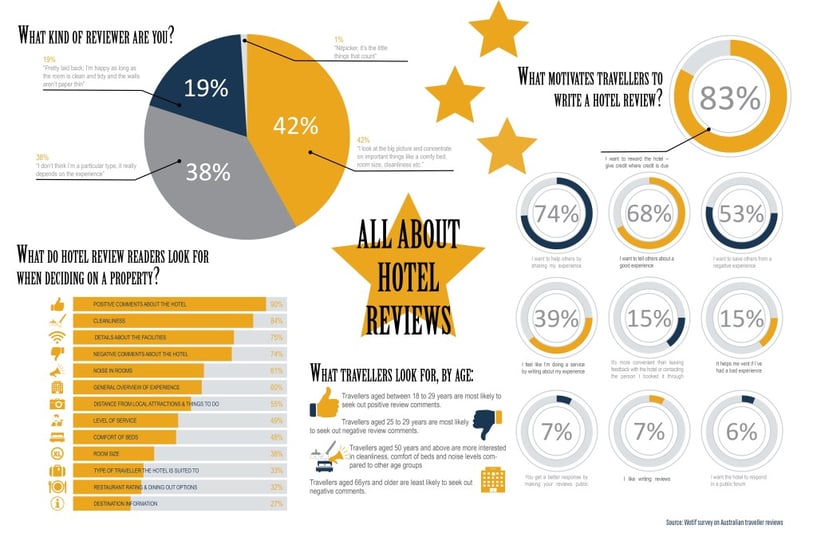This article was originally published by .hetras and written by Agnes Stockburger. It has been edited by Net Affinity.
Negative reviews are more likely to be met with a dejected shake of the head than fireworks, if you’re like most hoteliers. However, it may be time to look at your harshest critics as an opportunity instead of a curse — if the latest industry research and opinions are anything to go by, a well-managed negative review can yield some very positive results.
According to a study of 19,000 Australian travelers conducted by online travel agent Wotif.com, 91% admitted they used hotel reviews to make a decision. Furthermore, 77% said that they would be unlikely or highly unlikely to book a hotel with a poor review. It’s no wonder, then, that a negative review can inject fear into the heart of even the most confident hotelier!
Here’s the Good News:
The news isn’t all bad. It seems that most travelers are critical thinkers who are willing to have their opinions swayed if a negative review is addressed in the right way. The Wotif study data revealed that the way a hotel reacted to criticism could change a traveler’s opinion and even their actions.
“More than two thirds (69%) of Australian travelers say they’re either likely or highly likely to overlook a negative review if the hotel’s management has addressed the issues raised,” said Wotif travel specialist, Kirsty La Bruniy. In more good news, the study revealed that travelers don’t go online specifically to seek out the negative, but rather the positive, elements of a property. Ninety per cent of travelers said they looked for positive comments when making their decision, with only 74% looking for negative critique.
Travelers aged between 25-29 years were the group most likely to seek out negative reviews, with travelers aged over 66 least likely to look for the negatives. The cherry on top is that millennials — travelers aged 18-29 — were the group most likely to look for positive reviews. They’re also the ones likely to spend the most time on social media.
How Can You Manage Negative Reviews?
Most travelers aren’t looking for your failings; they simply want reassurance that they’re going to have a pleasant stay. Provide that reassurance even in the face of a negative review, and watch your website’s conversions multiply.
According to managing director of training at research company OOPS and author of The VIP Principle Michelle Pascoe, there are six things to consider when making negative reviews work for you:
1. Embrace the negative
Times have changed; guests are more demanding and technologically savvy, and a recent study from Expedia reveals that travelers visit an average of 121 different websites in the 45 days leading up to purchase..
“In learning to draw and keep 21st century guests, you need to know how they see and engage in your venue. If you are not in the business of listening to them, you may not be in business for long,” says Pascoe. Guests are entitled to an opinion, even if that means sometimes that opinion is negative. Listening means accepting good and bad.
2. Respond promptly
The nature of the internet is such that within minutes of a review being posted, it can be read by a few or a few thousand. For this reason, Pascoe emphasizes that it’s critical that hoteliers respond immediately.
“The longer the review sits without any response from you, the more opportunity it has to be read,” she says, “The most important element is to have someone in your organization scan reviews daily [or more] and to deal with them.”
3. Be polite – and don’t blame the guest!
Always thank a guest for their feedback, be polite and don’t place blame on the guest, however you personally feel about it. Try not to blame an individual staff member or a supplier, either. Graciously apologize for any trouble they had, and address the guest’s issues instead of looking for a place to put the blame.
A guest will appreciate a response that addresses their concerns much more than one that looks for an excuse.
4. Review before you hit send
An abrupt or defensive tone can damage a relationship with the reviewer and negatively impact on anyone who reads it on social media. If someone reads a response to a negative review that blusters or claims the guest is at fault, it’s likely to raise a few eyebrows.
“Always take a moment before responding. Write your response and edit it. Read it out loud, read it to someone else and take on their feedback before you hit send,” Pascoe says.
5. Have professional systems in place
Ensure your frontline staff are well trained in every facet relating to the guest experience: skills, service and crisis management. A professional team, well supported, will not only guarantee that negative experiences are dealt with promptly, but will go a long way to prevent them from happening at all.
6. Learn from your mistakes
A guest’s perspective may alert you to a better or different way of doing things.
“The devil is in the detail, and as owners and managers focused on the business, while working in the business, at times we miss the little things that can make a big impact on the guest,” Pascoe says. Use negative reviews as an opportunity to learn and tweak your business where it needs tweaking.
Conclusion

Unsurprisingly, top ranking hotels already follow much of this wisdom. Of the hotels listed on TripAdvisor’s “Top 25 Hotels — World”, every single one responded promptly and politely to negative reviews listed on the site.
Addressing negative reviews in the proper way is part of the secret of success for new generation hoteliers. Your hotel’s online presence is up for scrutiny, and to drive bookings you must carefully manage your interactions. If you’re prompt, polite and address a guest’s concerns, you can turn all your negatives into positives.




